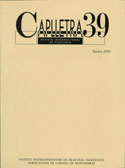La ciència en la poesia catalana del segle XIX
DOI:
https://doi.org/10.7203/caplletra.39.4851Palabras clave:
catalan poetry in nineteenth century, poetry and science, Romaticism, Realism, Naturalism Resumen
Resumen
The article offers a panoramic review of the relationship that Catalan poetry had with diverse sciences and technology, in the period which goes from the beginnings of Romanticism (although it still presents some illustrated reminiscences) to Realism and Naturalism. The theoretical debate is considered, as long as diverse attitudes of the writer towards science (that oscillate from mythification to the most retrograde tirades, passing through critical scientism) are pointed out. It also shows the numerous possibilities generated by the incorporation of scientific and technological elements, which so much affect stylistic and ideological aspects. The paper is based on an ample sample, which is focused on diverse authors and some motives are followed too. This sample, besides the interest that it has in itself, can also help to place in context Joaquim M. Bartrina’s poetic work, in which the relationship between Literature and Science especially bears fruit. Although the use of scientific and technological elements is neither a guarantee of modernity, progress nor of good literary results, it renews a poetry which used to be highly stereotyped, even moved away of the reality sometimes, in addition to establishing bridges between sciences and the humanities.
 Descargas
Descargas
Descargas
Publicado
Cómo citar
-
Resumen274
-
PDF (Català)203
Número
Sección
Licencia
El autor o autora que dirija un trabajo a la redacción de Caplletra para ser publicado tiene que ser la persona titular legítima de los derechos de explotación. La legitimación para la publicación del trabajo tiene que incluir también las imágenes, las tablas, los gráficos y otros materiales que puedan complementar el texto, con independencia de si es su autor o autora.
Copyright. Al publicar el trabajo en la revista, el autor o autora cede a Caplletra. Revista Internacional de Filologia los derechos de explotación (reproducción, distribución y comunicación pública), tanto para la edición impresa en papel como para la versión electrónica.
Todos los trabajos publicados en Caplletra se encuentran bajo una licencia Creative Commons del tipo Reconocimiento-NoComercial-SinObraDerivada 4.0.
RESPONSABILIDAD
Caplletra. Revista Internacional de Filologia no se identifica necesariamente con los puntos de vista sostenidos en los trabajos que publica.Caplletra. Revista Internacional de Filologia declina toda responsabilidad derivada de cualquier vulneración eventual de los derechos de propiedad intelectual que pudiera ser llevada a cabo por los autores o autoras.






